Last updated on June 3rd, 2020 at 10:19 am
Learning music theory is absolutely essential for every musician, and the great thing is that you don’t need to attend a music school to do it.
There are several online music theory lessons available and most of them are completely free, and I will list those websites in this article.
Let’s get started.
Lightnote
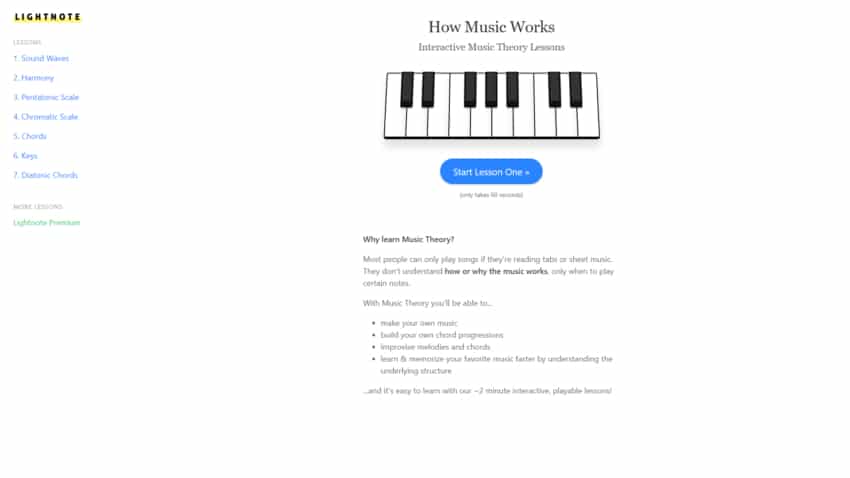
Lightnote is a site that will teach you the basics of music theory.
It features a total of seven free lessons that you’ll be able to complete fairly quickly.
As far as the lessons themselves go, they cover the following topics:
Lesson one; This one will teach you what sound waves are and it also allows you to click on the notes so you can hear the different types of sounds.
Lesson two; Here you will learn about basic harmony and why certain notes sound well together, or why they may not sound well together.
You can play two different audio files; one that creates a nice-sounding harmony, and another one that sounds a bit off, and you will learn why that is.
Lesson three; This one is about the 5 notes that go into the pentatonic scale, and you can also listen to the root note being played with other notes of the scale to see how they sound.
There are four more free lessons included about the chromatic scale, chords, keys, and diatonic chords, which are easy to understand and straight to the point, just like the previous lessons.
As I mentioned, these seven lessons can be completed in a matter of minutes, but I’d advise you to go through them a couple times so that the concepts have a chance to really sink in.
Now, apart from those 7 free lessons, you can also access the premium course which sells for $29 and $59, and features hundreds of lessons, interactive exercises, ear training (with the $59 one), and much more.
The premium course will teach you basic chord progressions, understanding what notes to play over those chords, the underlying structure of the popular music genres, and more.
Website: Lightnote.
This post is part of a big list I compiled about the best websites to learn musical instruments, and you can find that article here.
Music Theory (Free up to $2.99)
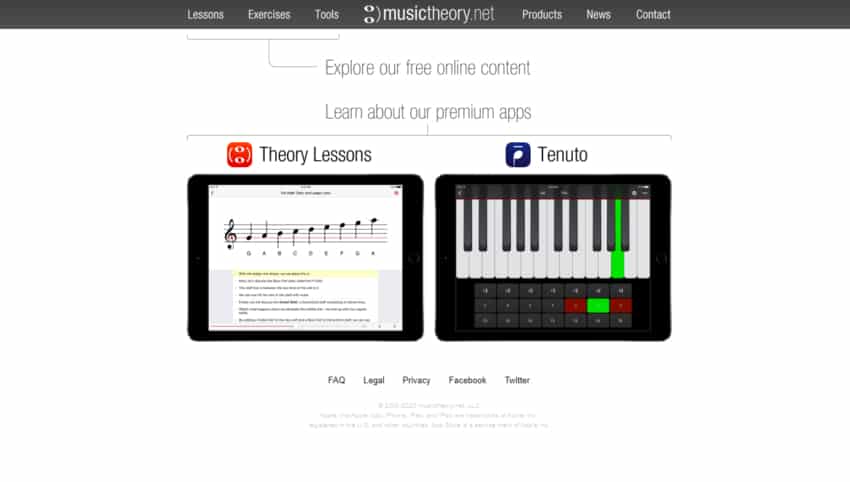
Music Theory is a site that offers lessons, exercises, and tools to students for free.
The eight extensive courses on this site will teach you the basics, as well as give you a better understanding of the terminology, and after that you will learn rhythm and meters and how they are used.
Additionally, you will be taught about the different scales and key signatures, as well as intervals, Chords, diatonic chords, chord progressions, and Neapolitan chords.
Similar to Lightnote, the exercises on this website are interactive and allow students to play around with different notes as they go, and being able to listen to these examples is crucial for learning.
All of the information on Music Theory you can get completely for free; however, you can also purchase their mobile app for $2.99, which is money they strictly use to support the site.
Now, they also offer Tenuto, which is an ear-training software that sells for $3.99 and that can be used on mobile devices.
I wrote another post about ear training software that you can read here.
Website: Music Theory.
Tone Savvy (Free)
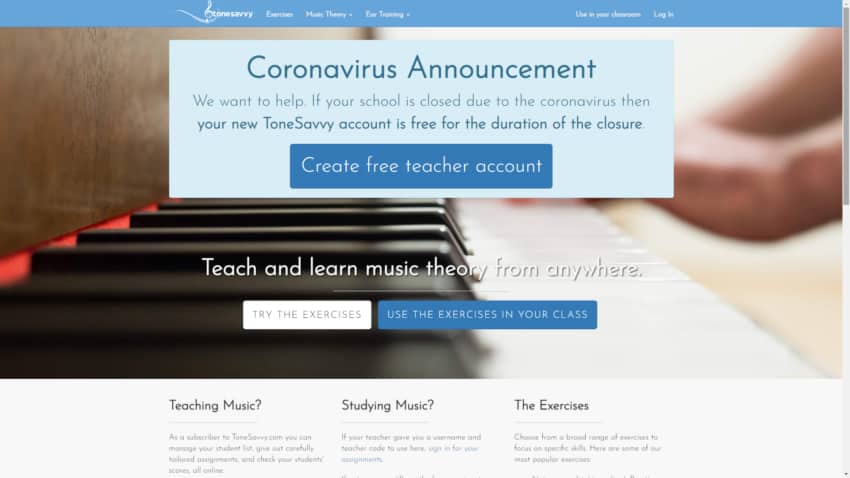
While you can learn music theory at Tone Savvy, did you know that it’s also a great website for teachers?
You can sign up with them for a teacher account, which you can get for free for 14 days and then it’s $19/mo., up to $99/mo., depending on how many students you have.
With it you can manage your student list, give out carefully tailored assignments, and check your students’ scores, all online.
However, this post is about learning music theory, so here’s what Tone Savvy has to offer to anyone who wants to learn music theory for themselves:
You will have access to lessons about the different Note Names, Interval Identification, Interval Building, Chord Identification, Chord Building, Chord Functions, Rhythm Dictation, the different Key Signatures, and more.
The interesting thing about Tone Savvy is that they have quizzes for each lesson you take where you will be asked to answer certain questions.
Depending on how well you answer these quizzes, you will get a score, and this will let you know how much you actually learned.
These quizzes start off real easy, but they get harder and harder pretty damn quick!
Additionally, ear training is also available on their site, and you’ll be able to practice intervals, chords, scales, and more!
I definitely recommend Tone Savvy to anyone who wants hands-on practice.
Website: Tone Savvy.
Coursera

While the other sites on this list follow more of a “self-learning” approach, Coursera offers courses taught by university teachers, and it even gives you the chance to get a degree once you finish the course.
Of course, the courses themselves are quite affordable, but in order to get the degrees you’ll have to pay extra. Still, it’s nice to have this option.
As far as music theory courses go, Coursera offers one for beginners called “Getting Started with Music Theory”, which is taught over the course of 4 weeks and is for people with little to no knowledge about music.
However, there are many others that cater to beginners- all the way to advanced.
Here are the ones I’d recommend checking out:
Fundamentals of Music Theory (Beginner)
Approaching Music Theory (Intermediate)
I also mention Coursera on another post of mine about the best online music production courses, that you can check out here.
What I like about Coursera is that they offer a huge number of courses on almost anything, and as far as pricing goes, all courses are very affordable.
Sadly, you have to pay for each individual course instead of a monthly membership that gives you access to everything.
Still, very recommendable.
Mugglinworks (Free up to $7.98)

Mugglinworks was created by a music educator named Stephen Mugglin, who created the site to help anyone interested in learning about music theory.
You will have access to short and to the point lessons about scales, note numbers, chords, Keys, Chord Variations, major and minor scales, the circle of fifths, the different modes like Lydian, Dorian, etc., and more.
Also included are maps and charts about all the different chords there are, as well as the different chord progressions.
You can also download all of this information as a PDF e-book for $7.98, but it’s all there on the site for free!
One cool feature you’ll find on this website is the ChordMaps2 iPad App, which basically works as MIDI controller and helps you explore different chords, chord progressions, etc., while triggering sounds from your favorite synths.
Related: I wrote a post about the best Synth VSTs available which you should also check out!
The “ChordMapMidi” app is also available, which is an app for iPhone that lets you experiment with chords wherever you are, one finger tap at a time.
Website: Mugglinworks.
EarMaster (Free)
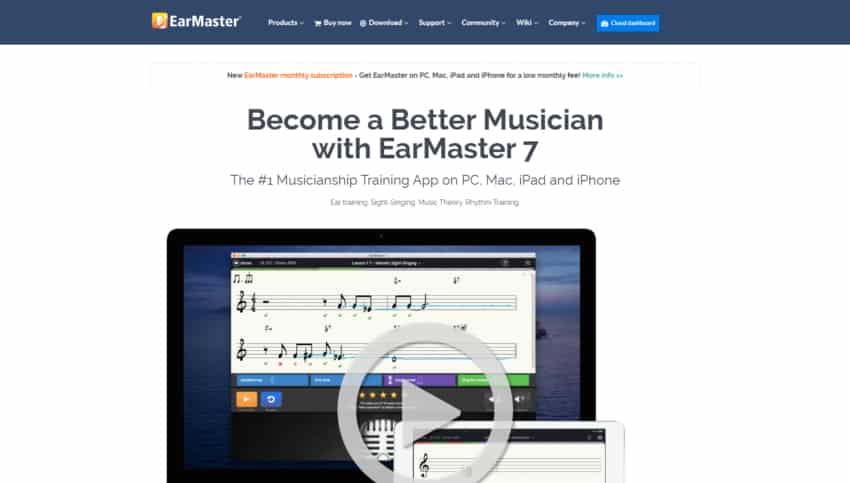
EarMaster is a website designed to help students become better musicians by giving them information about music and helping them understand how it works.
The page offers six chapters in which students will learn about notation, definition of the terms, sound waves, notes and scales, harmony and form, and one last chapter where you will face certain challenges.
This tool isn’t interactive the way some of the other websites are, but students will learn the same information the other sites teach.
The chapters are separated into parts so there’s a lot of information to learn about each topic and students are invited to practice the exercises on their iPhones, iPads and computers.
As far as the lessons themselves go, they are quite extensive and in-depth, which is definitely a pro, especially if you want to learn the right way.
Plus, it’s free!
I also mentioned EarMaster on another post I wrote about the best ear training websites, since it also offers software dedicated for this.
Website: EarMaster.
Jazz Guitar Online (Free up to $49.99)
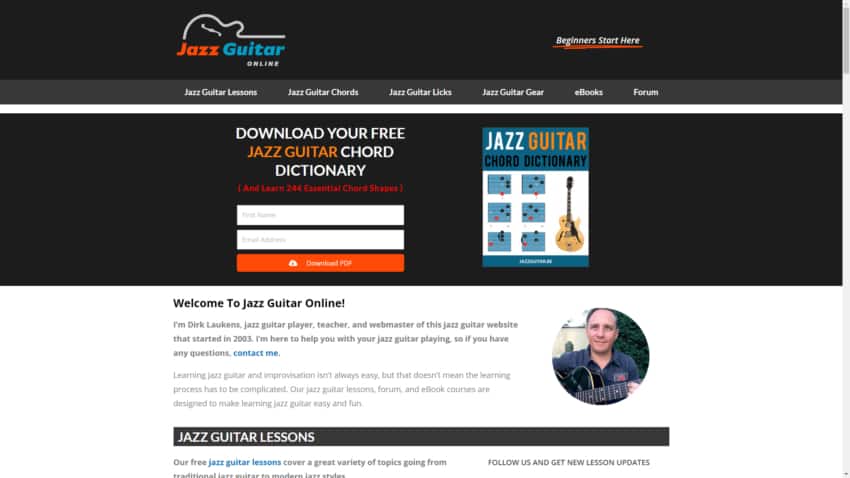
This website is not strictly about music theory, but rather theory applied to jazz guitar, and I included it in this list mainly because it provides some of the information that all other websites on this list don’t.
Jazz Guitar Online is designed for students who want to learn the basic theory behind Jazz music.
For free you can access the “Jazz Guitar Chord Theory” lesson, which is fairly short but covers all the different chords used in jazz.
You will learn how to construct major and minor chords, Diminished chords, diatonic chords, as well as the theory of what notes actually conform a chord.
Additionally, information about 7th chords, Dominant, 9th chords, and much more is also included, plus you will learn how to use them the right way when playing guitar.
On this website there are a couple other lessons available about Quartal Chords, Drop 2- and Drop 3 chords, and more
Lastly, you can take a Quiz to see how much you learned once you’re done going through the lessons.
Website: Jazz Guitar Online.
One Minute Music Lessons (Free)
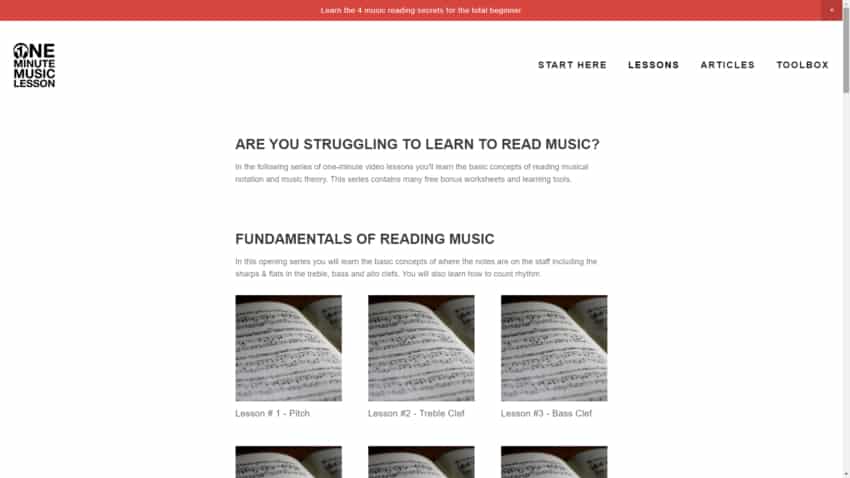
One Minute Music Lessons is all about teaching you the fundamentals of music in a short and to-the-point way; the clue is in the name.
On this website you will be able to learn about the fundamentals of reading music sheets, as well as an introductory course about basic music theory.
The music theory covers some of the following topics; Intervals, Overtones, Octaves, Major- and Minor Scales.
The information here isn’t as vast as what you can find on EarMaster, or probably any other website on this list, but they are extremely short and easy to understand.
Website: One Minute Music Lessons.
Berklee (Free)
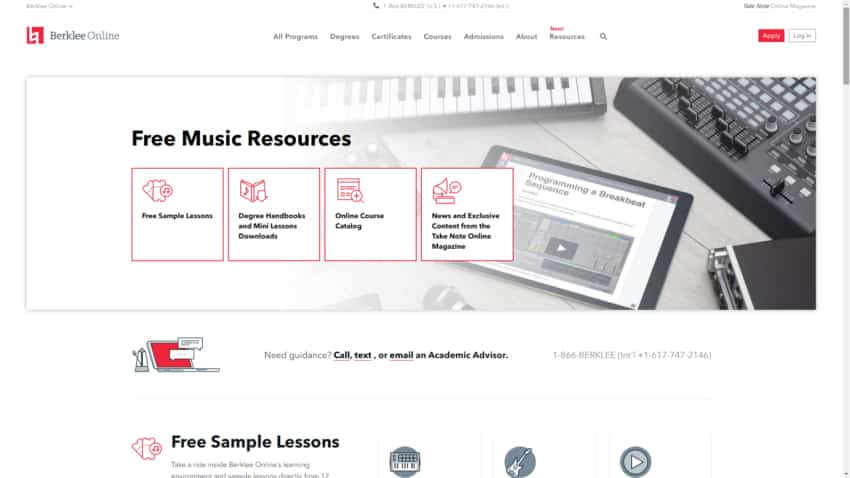
Berklee is probably the best-know music school in the world right now and most of their courses and careers are very expensive; however, they offer some free recourses on their website about many different subjects, and music theory is one of them.
In this short course you will learn about scales; Mayor, chromatic, whole tone scales, etc., as well as the different key signatures.
And there is even some ear training included as well as a couple assignments that should help the concepts sink in faster.
This free music theory course is actually part of their “Music Theory 101” course, which is not free but covers most of the basic theory you will ever need.
As far as the free lessons go, there are some other interesting ones, not necessarily about music theory, that you can also take advantage of, covering topics such as; Music Marketing, Film Scoring, Music Production Fundamentals for Songwriters, and more.
Website: Berklee.
Other useful Posts
I wrote a couple articles about learning certain music instruments that you might find useful, here they are:
- Websites to learn how to play Guitar
- Websites to Learn How to play the Piano
- Online Music Production Courses
- Online DJ Courses
Conclusion
I like EarMaster and Tone Savvy the best, but all of these websites have something to offer to anyone who needs to learn about music theory.
I hope this information was useful.
Have a wonderful day!
